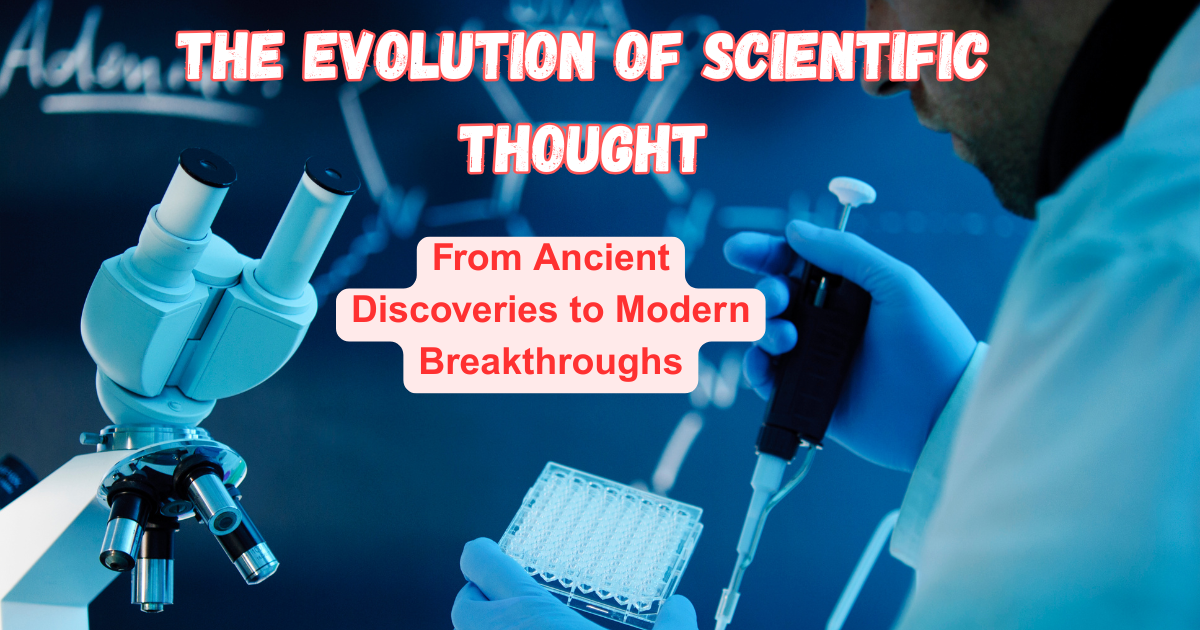The Evolution of Scientific Thought: From Ancient Discoveries to Modern Breakthroughs, the word science comes from the Latin for knowledge. Science can be thought of as a collection of knowledge and processes. This knowledge encompasses what has been discovered and understood, as well as the process and collection of new knowledge.
The Evolution of Scientific Thought
The evolution of science boomed in the 17th century. Instruments like the telescope, microscope, clock, and barometer were developed and used to understand the world. Since the beginning, humans have been trying to understand how things work or behave; the Greek people are credited with being the first people to develop theories about their observations. A theory is an idea or set of principles that is well substantiated and accepted to be true. The development of science has continued to develop in all different areas of the world. The Middle Ages, also referred to as the medieval period, saw growth in universities.

The quest to understand nature has been central to human intellectual pursuits. From the atomistic philosophies of ancient Greece to the quantum mechanical principles of the modern era, scientific thought has evolved dramatically.
Evolution of Science
The scientific method is a set of processes used to gather knowledge about the world. Struggles between religion and culture played a role in the development of science during this time. Science started to move towards processes utilizing the scientific method.
The duality of light and matter
One of the most profound discoveries in modern physics is the wave-particle duality of light and matter. Both exhibit dual wave behavior, as demonstrated through experiments like the double-slit experiment, where electrons and photons display interference patterns characteristic of waves while also exhibiting particle-like properties upon measurement.
Ancient Discoveries to Modern Breakthroughs
Science was never static, nor was it across time and space to unveil the mystery of the cosmos. For since those days, man has been gazing up, pondering, carrying out experiments, and reaching conclusions in his surroundings.
1. Ancient Civilizations and the Dawning of Science
It cannot, then, tell the difference between science and philosophy, mysticism, or religion when human society is at its nascent stage. The basis of most scientific theories was laid down but is not the interpretation understood today. The achievements of the Mesopotamians and the Egyptians have been as the earliest scientific observers, and they are really great at astronomy and mathematics.
2. Scientific Revolution:
Turning point of science history in its timeline: the Renaissance period, when Europe of the Dark Ages began to rebirth itself, then rediscovered classical knowledge, plus improvements in the printing and communication process, led to the scientific developments in the 16th and 17th centuries known as the Scientific Revolution.
3. Illumination and Elaboration of scientific Thought
Scientific thought in the 18th Century Enlightenment allowed it to spread into new borders of physics and astronomy. Enlightenment belief was that most problems in the world could be solved by reason and experience. His work pretty much dethroned the phlogiston theory, from which he formed modern chemical reactions and stoichiometry satisfactorily.
4. The 19th Century
Although a precursor to physics and chemistry, it was within the nineteenth century itself that biology matured as an independent scientific discipline. Life was always ancillary to the physical sciences, but a sequence of paradigm-changing discoveries transformed and finally unlocked this vast and intricate subject of life.
New Ideas
Many new ideas contributed to what is called the scientific revolution.
- Studying human anatomy based upon the dissection of human corpses, rather than the animal dissections, as practiced for centuries.
- Discovering and studying magnetism and electricity, and thus the electric properties of various materials.
- Modernization of disciplines (making them more as what they are today), including dentistry, physiology, chemistry, or optics.
- Invention of tools that deepened the understanding of sciences, including the mechanical calculator, steam digester (the forerunner of the steam engine), refracting and reflecting telescopes, vacuum pump, and mercury barometer.
Conclusion
In this article, we discussed The Evolution of Scientific Thought: From ancient discoveries to modern breakthroughs, the word science comes from the Latin for knowledge. The scientific method is a set of processes used to gather knowledge about the world. A theory is an idea or set of principles that is well substantiated and accepted to be true.